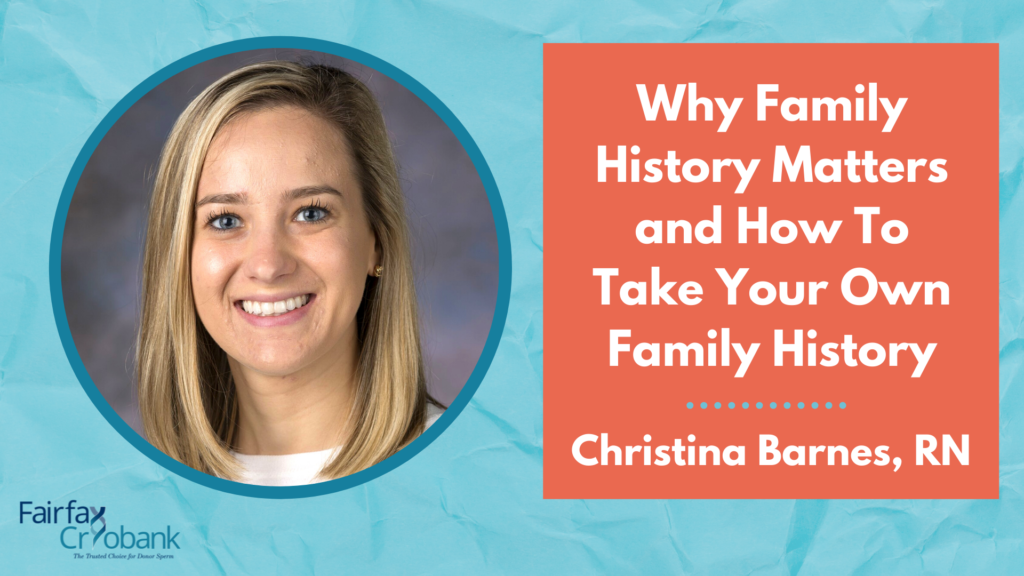Why Family History Matters and How To Take Your Own Family History
Guest Blogger, Christina Barnes, RN, writes about the importance of family history and how to track your own.

You and your partner are trying to get pregnant, and maybe you’re starting fertility treatments or looking into using donor sperm or eggs. Somewhere along the way, your physician or a genetic counselor or a nurse asks you: Do you have any family history of autoimmune disorders? Or heart defects at birth? Or blood clotting disorders? Or…. the list goes on. If you’re like most people, you probably have no idea if any of your parents’ siblings had issues with blood clotting (or even what that means). Fortunately, there’s an easy way to get and organize this information: a family history.
What is a family history?
A family history, in the medical world, is health information about you and your close relatives. “Close relatives” usually means your children, parents, grandparents, siblings, half-siblings, aunts, uncles, nieces, and nephews. Some healthcare providers will not ask about all of these people; they may limit it to parents, grandparents, and siblings. However, it can be very helpful to know if your niece was born with a heart defect or cystic fibrosis, as this may be a sign of a genetic disorder that can run in families.
Why should I know my family history?
A family history is one of the most important tools we have for understanding someone’s risks for inheriting or passing on a disease. If you discover that one of your grandparents had sickle cell disease, your risks of having a child with sickle cell disease may be higher than someone with no family history of the disease. Family histories can also highlight patterns of illnesses throughout families and alert you to a possible problem. Your healthcare providers can use this information to order appropriate tests, such as blood tests for specific genetic defects. If you find out that you are a carrier for a genetic disease, you will be able to make more informed decisions about how to proceed with a pregnancy. For more information on your carrier status, see my blog post “I’m a Carrier For a Genetic Disease – Now What?”

How To Take Your Family History
When healthcare providers ask you about your family history, they usually go down a list of body systems and diseases and ask if anyone in your family has a history of each disease. This list can sound random, but the diseases are organized by what part of the body they affect (heart, lungs, gastrointestinal, etc).
I’ve included two templates: the first is a list of your family members with sections to note their name, status (alive or deceased), health problems, and the age at which their health problems started (birth, age 50, etc). You should tailor this to your actual family; if you don’t have any uncles, remove those rows. You don’t need to fill this out for someone you don’t share any blood relation to – for example, your brother’s wife. If you will be using your partner’s egg or sperm to conceive, your partner should take a separate history for their own biological family.
The second template is a list of the common body systems and diseases. Some of the diseases are listed multiple times using both technical and more common names, such as Von Willebrand Disease and Bleeding Disorder. Von Willebrand Disease is a bleeding disorder, but your grandfather may be more familiar with the term bleeding disorder and refer to his disease in this way. By including as many terms as possible, we can increase our chances that someone will identify a condition.
Use these diseases as a guide for what you should ask your family members when getting their histories. For example, when asking your grandfather about his own cardiac history, you can say: “Do you have any history of aortic stenosis? Any history of arteriovenous malformation?” and so on. This chart is not a list of every known disease, so it’s important to ask if your family members have any diseases or problems that you didn’t mention. Some rare genetic diseases, for example, might get overlooked if the family members with the disease died many years ago.
To begin, go through these lists and fill in what you know. Next, take them to your grandparents, parents, siblings, aunts and uncles and ask them if they or anyone related to you has a history of any health problems. Once you do this, you’ll have a good family history that you can take with you to doctor’s appointments, share with the genetic counselor at the sperm bank, or keep for your own records. Another bonus: your future child will have a complete, detailed family history of his or her own.
Template 1: Family History Template by Family Member
| Relationship | Name | Status | Health Problems | Age of Onset |
| Mother | ||||
| Father | ||||
| Brother | ||||
| Sister | ||||
| Maternal Grandmother | ||||
| Maternal Grandfather | ||||
| Paternal Grandmother | ||||
| Paternal Grandfather | ||||
| Maternal Aunt | ||||
| Paternal Aunt | ||||
| Maternal Uncle | ||||
| Paternal Uncle | ||||
| Cousin | ||||
| Niece | ||||
| Nephew | ||||
| Other |
Template 2: Body Systems and Diseases
| Body System | Health Problems |
| Neurological | Alzheimer’s Disease Bell’s Palsy Brain Cancer Cerebral Palsy Craniosynostosis Epilepsy Fibromyalgia Huntington Disease Hydrocephalus Meningitis Microcephaly Spinal Cancer Spinal Muscular Atrophy (SMA) Stroke |
| Ears, Nose & Throat | Allergies Cleft Lip Cleft Palate Cochlear Implant Conductive Hearing Loss Deafness Eye cancer Glaucoma Macular Degeneration Oral Cancer Throat Cancer |
| Eyes | Blindness Cataract Retinal Detachment |
| Cardiovascular (Heart) | Aortic Stenosis Arteriovenous Malformation Arrhythmia Cardiac Surgery Cardiomyopathy Coarctation of the Aorta Congestive Heart Failure Coronary Artery Disease Heart Attack (Myocardial Infarction) Hypertension (high blood pressure) Hypoplastic Left Heart Valvular Heart Disease |
| Pulmonary (Lungs) | Asthma Bronchopulmonary Dysplasia Chronic Obstructive Pulmonary Disease Cystic Fibrosis Emphysema Lung Cancer Pulmonary Embolism |
| Musculoskeletal | Arthritis Bone Cancer Club Foot Connective Tissue Disease Dwarfism Muscular Dystrophy Osteoporosis Osteosarcoma Rheumatoid Arthritis Scoliosis |
| Skin | Eczema Herpes Melanoma Psoriasis Scleroderma Tuberous Sclerosis |
| Endocrine | Congenital Adrenal Hyperplasia Cushing’s Syndrome Diabetes Type 1 or 2 Grave’s Disease Growth Hormone Deficiency Hashimoto’s Thyroiditis Hypothyroidism Thyroid Cancer |
| Genitourinary (Genitals/Urinary) | Ambiguous Genitalia Anorectal Malformation Atrophic Kidney Cervical Cancer End-Stage Renal Disease Endometriosis Hypoplastic Kidney Hysterectomy Infertility Kidney Cancer Kidney Disease Ovarian Cancer Ovarian Cysts Polycystic Kidney Disease Renal Failure Testicular Cancer Uterine Cancer Wilms Tumor |
| Gastrointestinal | Celiac Disease Colon Cancer Crohn’s Disease Diverticulitis/Diverticulosis Gallbladder Disease Hepatitis Hirschsprung’s Disease Inflammatory Bowel Disease Irritable Bowel Syndrome Liver Cancer or Disease Pancreatic Cancer or Disease Stomach Cancer Ulcerative Colitis |
| Hematologic (Blood) | Alpha Thalassemia Trait Aplastic Anemia Beta Thalassemia trait/minor Bleeding Disorder Hemophilia Leukemia Lymphoma Sickle Cell Disease Von Willebrand Disease |
| Psychiatric Behavioral Developmental | Alcoholism Anorexia Anxiety Attention Deficit Disorder (ADD) Attention Deficit Hyperactivity Disorder (ADHD) Bipolar Disorder Bulimia Developmental Delay Depression Obsessive Compulsive Disorder (OCD) Oppositional Defiant Disorder (ODD) Schizophrenia Suicide (completed or attempted) |
| Other | Acquired Immune Deficiency Syndrome (AIDS) Autoimmune Disorder DiGeorge Syndrome Down Syndrome Early childhood death Human Immunodeficiency Virus (HIV) Infant SIDS death Klinefelter Syndrome Multiple Sclerosis Parkinson’s Disease Pierre Robin Syndrome Prader Willi Syndrome Prematurity/Preterm Labor Stillbirth Treacher Collins Syndrome Turner Syndrome Motor vehicle accident Other sudden or unexplained death |







